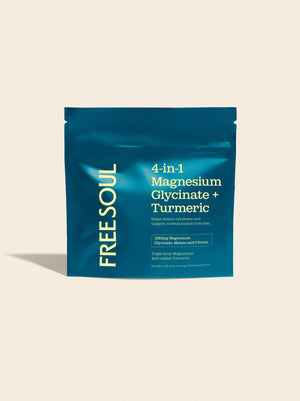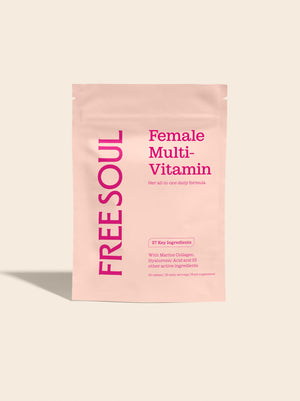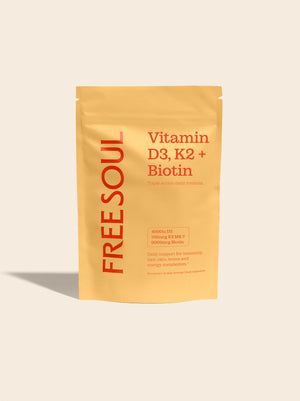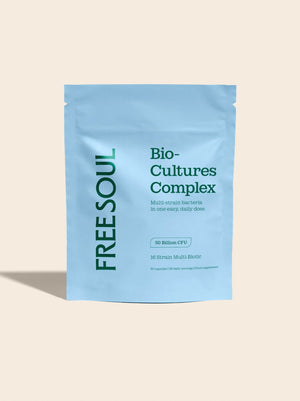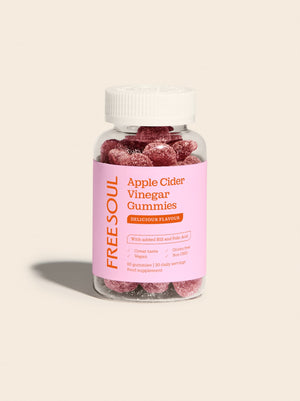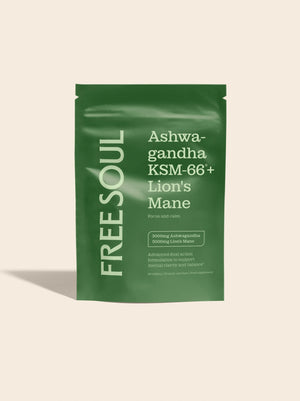So, what is Creatine?
Creatine is a compound that is naturally found in our bodies, primarily in the brain and muscles. It helps produce quick, accessible energy, making it great for supporting exercise routines. However, it also plays an important role in cognitive function and hydrating muscles.
While we can get some Creatine from food and our bodies make a little naturally, supplementing can help maintain our bodies supply – supporting everything from muscle function to mental clarity.
Myth 1: Creatine is just for bodybuilders
Let’s get a biggie out the way – no, Creatine isn’t only for people pumping serious iron or smashing out HYROX training. Sure, it supports short bursts of energy during exercise, but that’s just one of its benefits.
Creatine occurs naturally in foods like red meat and fish, so if you’re following a vegetarian or vegan diet, it can help fill a possible deficit. Women also tend to have lower Creatine stores than men, around 70-80%, which makes topping up even more valuable. Even if you’re not a dedicated gym-goer, Creatine’s support for muscles, energy, and cognitive function is still hugely beneficial.
Myth 2: Creatine causes water retention and bloating
Probably the most widespread misconception people have about Creatine is that it causes significant water retention, which causes visible bloating and weight gain. This myth stems from the fact that Creatine supports muscle hydration, helping your muscles retain water.
However, because this happens predominantly in the muscle cells, not subcutaneously (under the skin), it does not cause noticeable bloating. Any additional water weight is mild and temporary, and many users don’t even notice it at all.
Myth 3: Creatine causes dehydration and muscle cramps
This myth comes from the idea that because Creatine draws water into your muscles, it must be pulling it away from the rest of your body, leaving you dehydrated and prone to cramps. That’s not how it works. Creatine helps increase the water within your muscles (known as intracellular water), which actually supports hydration where it's needed most during exercise.
Intense exercise and inadequate fluid intake are the main cause of dehydration and cramping. Creatine doesn’t replace hydration, but it doesn’t interfere with it either. Just make sure you're drinking enough water and electrolytes when training hard or in hot weather.
Myth 4: Creatine and coffee
Next up we have the myth that caffeine and Creatine together is a no-no, due to the belief that coffee “cancels out” the effects of Creatine. This idea may have originated in early studies, but the science has since moved on.
Recent research hasn’t found consistent evidence that caffeine interacts with the effects of Creatine, and notes that people can safely take both without experiencing side effects. So, if you prefer to enjoy your daily Creatine alongside your morning coffee, go right ahead.
Myth 5: Creatine is high in calories and causes fat gain
Perhaps because of its association with gaining muscle mass, one of the most pervasive myths about Creatine is that it is calorific and causes weight gain. But here’s the truth: pure Creatine monohydrate contains zero calories.
If you notice a slight weight increase after starting Creatine supplementation, it’s typically due to water being drawn into your muscle cells. That’s a sign that it's working as it should to support hydration and performance. It’s not fat gain, and certainly not from added calories.
Myth 6: Creatine messes with your hormones (and causes hair loss)
In 2009, a small study involving university-aged rugby players registered a rise in DHT (dihydrotestosterone – a hormone linked to hair loss) after taking Creatine, which is where this myth seems to have originated from. However, the study involved just 20 men and, importantly, no participants experienced hair loss during the trial.
Since then, no other studies have replicated these findings and there is currently no direct evidence that Creatine causes hair loss. But what about other hormones? There’s also no evidence that Creatine influences testosterone or oestrogen levels, so it doesn’t interfere with fertility or periods, and is in fact considered to be beneficial for women’s health.
Why we created Free Soul Creatine (and what makes it different)
There’s no shortage of Creatine options out there, but most are made with a one-size-fits-all approach, and rarely designed with women’s needs in mind. We’ve created a range that offers high quality Creatine, specifically designed to support the wellness goals of the women in our community. Here’s what makes our Creatine products unique:
- Just pure, micronised Creatine Monohydrate – no added extras
- Easily absorbed to support strength, energy, cognitive performance, and muscle recovery
- Flavourless and perfect to mix into any of your favourite drinks
- Free Soul’s CreaDrate complex (Creatine Monohydrate, Electrolytes, Vitamin C, Coconut Water Extract, and AstraGin®)
- Naticol® Marine Collagen
- Supports cognitive and physical performance, while promoting healthy hair, skin, and nails – that’s strength and glow in one simple scoop
- Delicious raspberry flavour
- Free Soul’s CreaDrate complex (Creatine Monohydrate, Electrolytes, Vitamin C, Coconut Water Extract, and AstraGin®)
- Formulated to support hydration, energy production and muscle function
- Ideal for pre or post-workout
-
Refreshing strawberry mango flavour
The takeaway? You deserve the facts
TL;DR – there’s a lot of myths about Creatine, but here’s what you really need to know:
- ✅ Creatine doesn’t cause bloating
- ✅ It’s not just for muscle gain – it supports energy, focus and recovery
- ✅ It won’t mess with your hormones, nor will it affect fertility or periods
- ✅ You can take it with coffee, it won’t dull the benefits
- ✅ It won’t dehydrate you, in fact, it helps muscles stay hydrated
- ✅ It’s zero calorie and doesn’t cause fat gain
Ready to feel the difference? Explore Free Soul Creatine and discover a formula that works for you.








